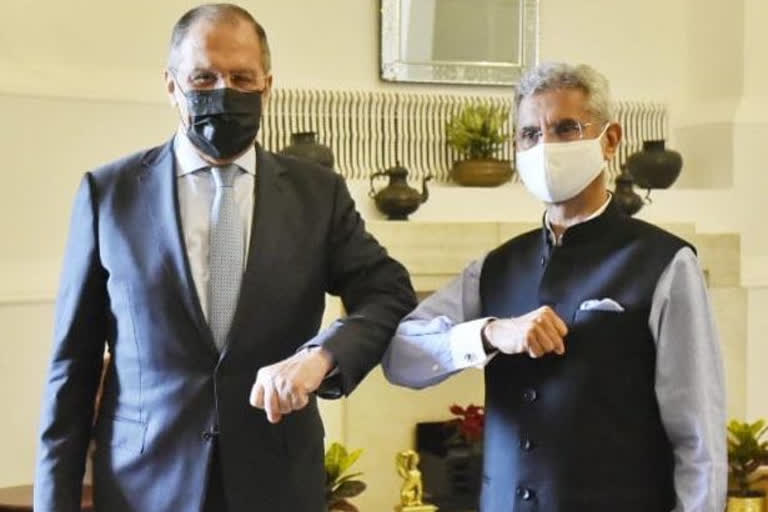New Delhi: Russian Foreign Minister Sergey Lavrov on Tuesday met his Indian counterpart Dr S Jaishankar. Both leaders discussed the entire gamut of bilateral cooperation between the two countries. Lavrov is on a two-day official visit to India starting April 5.
Lavrov’s visit to India comes in the backdrop of the Intra-Afghan talks in Istanbul planned for this month. The bilateral meeting provided an opportunity for both sides to present their views on the Afghan peace talk. Moreover, the visit provided a unique opportunity to discuss important aspects of bilateral ties and also review preparation for the next India-Russia annual summit.
Also read: Will raise Oxford University's racism issue when required: EAM
An expert opines that this is a much broader visit in terms of geopolitical understanding between India and Russia. Speaking to ETV Bharat, Prof Harsh V Pant, Director, Research at Observer Research Foundation, New Delhi, said, “The visit is about trying to ascertain each other views on critical matters of regional and global politics.
On the Afghan issue, the interest of India and Russia are diverging and Russia wanted to keep India out of the peace process, whereas, America is bringing India back into the peace process. These are a sign of times how things have changed and evolved, where Russian foreign policy is looking at the world through the prism of its struggle against the West, and Indian foreign policy is coming to terms with the rise of China as its primary strategic challenge"
During the press briefing after the bilateral talk, Jaishankar said, “One question on which we spent some time is the unfolding developments in and around Afghanistan. As you all know, the Heart of Asia – Istanbul Process conference took place last week and I was in Dushanbe for that. There had been other discussions of a bilateral or plurilateral nature as well. Many more can be expected in the coming days."
“For India, what happens in Afghanistan impacts its security directly. I shared our approach that for durable peace, we would require harmonizing interests of all, both within and around that country. The peace process must be based on foundational principles to which we all subscribe. And a political solution should mean an independent, sovereign, united and democratic Afghanistan,” Jaishankar reiterated.
Also read: Pakistan and India cannot afford a war, says Pak FM
Underlining Russia’s stand on the Afghan peace process, Lavrov said, "A solution of the Afghan civil war should balance the ethnic and religious groups of Afghanistan and no group should be left out of the final settlement of the war." India and Russia are working towards stability and connectivity in the Asia-Pacific, he said and urged that “security alliances” should not come up in Asia.
Addressing the joint press briefing, Jaishankar said both sides held talks about the longstanding partnership in nuclear, space and defence sectors. "We assessed positively our economic cooperation, noting the new opportunities in Russian Far East. We spoke of connectivity, including the International North-South Transport Corridor and the Chennai-Vladivostok Eastern Maritime Corridor," he said.
"Our rapidly expanding energy cooperation, that now includes long term commitments, was also on the agenda. On my part, I briefed Minister Lavrov on recent developments in India that open up new opportunities for Russian businesses in various sectors. The Atmanirbhar Bharat economic vision can facilitate a more contemporary economic relationship in the post-Covid era," Jaishankar said.
Lavrov on the other hand underlined that India and Russia are tied through strategic partnership and have a long-lived friendship. He said bilateral and political dialogue between the two countries is at its "sustainable highest" even amid COVID-19 restrictions.
Also read: Goa Speaker to pass orders on disqualification on 20th April
Both sides also exchanged views on West Asia, the Gulf and Iran as this is a geography where both countries have longstanding equities and the active diplomacy between the two nations reflects that to great measure.
Both sides laid special importance on Indo-Pacific and Quad. India reiterated that Russia is a very important partner. "India is strongly committed to ASEAN centrality and this is underlined by the Indo-Pacific Oceans Initiative that it has been advocating at the East-Asia summit. As we implement our Act East and Beyond policy, Russia is a very important partner... whether it is the Far East or the Chennai-Vladivostok Corridor," Jaishankar told the media.
It is pertinent to note that India has also taken over the Chair of BRICS and RIC from Russia for this year. The India- Russia common membership of the G-20, ASEAN-led forums, SCO and CICA remained a part of the conversation between the two leaders.




